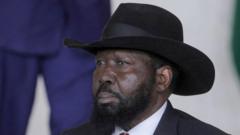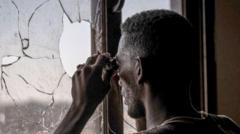In light of escalating tensions over visa policies, South Sudan's government has agreed to accept a man recently deported from the United States, marking a significant reversal aimed at mending ties. This decision follows US Secretary of State Marco Rubio's announcement that all South Sudanese citizens would face visa restrictions due to the country's non-cooperation in accepting its deported nationals.
South Sudan Softens Stance on Deportee Amid Visa Tensions with US

South Sudan Softens Stance on Deportee Amid Visa Tensions with US
South Sudan's government shifts its approach, allowing a deportee from the US entry to ease diplomatic strain.
Initially, South Sudan's foreign ministry claimed the deported individual was wrongly identified as a South Sudanese citizen and asserted he was, in fact, from the Democratic Republic of Congo. However, the government has since adjusted its position, stating they will permit the man to enter the capital of Juba "in the spirit of friendly relations." This decision comes as South Sudan's authorities prepare to facilitate his arrival at Juba International Airport.
The US government's recent measures marked a significant shift in immigration policy and targeted all South Sudanese passport holders for the first time since President Trump re-entered office, reflecting a broader anti-immigration stance. Rubio emphasized that such actions could be reviewed if South Sudan demonstrated full cooperation in accepting repatriated individuals.
South Sudan's foreign ministry expressed disappointment over the blanket visa restrictions, highlighting the situation as an isolated incident tied to a misrepresentation. Deputy Secretary of State Christopher Landau, however, rejected South Sudan's explanations, asserting that the assertions from their embassy certified the individual as a South Sudanese national.
This diplomatic rift arises amid growing fears of renewed conflict within South Sudan, as tensions escalate following the house arrest of First Vice-President Riek Machar. The situation has led the US to withdraw non-emergency personnel from the region, citing security concerns. The recent turmoil also spurs anxiety over the upcoming expiration of Temporary Protected Status for South Sudanese nationals residing in the US, further complicating the relationship between the two nations.
Overall, the situation remains fluid as South Sudan navigates its internal challenges and international relations, particularly with the United States.
The US government's recent measures marked a significant shift in immigration policy and targeted all South Sudanese passport holders for the first time since President Trump re-entered office, reflecting a broader anti-immigration stance. Rubio emphasized that such actions could be reviewed if South Sudan demonstrated full cooperation in accepting repatriated individuals.
South Sudan's foreign ministry expressed disappointment over the blanket visa restrictions, highlighting the situation as an isolated incident tied to a misrepresentation. Deputy Secretary of State Christopher Landau, however, rejected South Sudan's explanations, asserting that the assertions from their embassy certified the individual as a South Sudanese national.
This diplomatic rift arises amid growing fears of renewed conflict within South Sudan, as tensions escalate following the house arrest of First Vice-President Riek Machar. The situation has led the US to withdraw non-emergency personnel from the region, citing security concerns. The recent turmoil also spurs anxiety over the upcoming expiration of Temporary Protected Status for South Sudanese nationals residing in the US, further complicating the relationship between the two nations.
Overall, the situation remains fluid as South Sudan navigates its internal challenges and international relations, particularly with the United States.






















